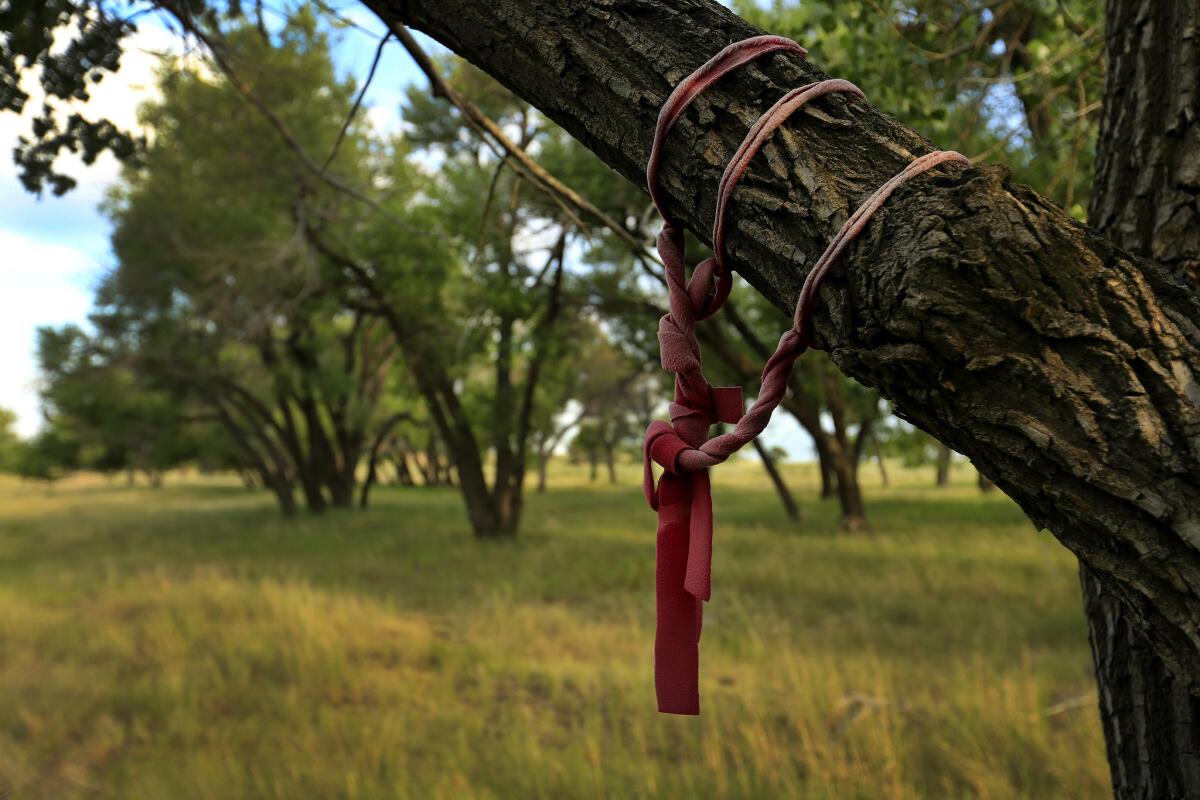‘So it won’t happen again’: How the descendants remember the Sand Creek massacre

- Share via
Sand Creek Massacre National Historic Site is unique within the national park system for throwing a spotlight on an atrocity that took place on American soil — a day of ethnic cleansing in contemporary parlance — and a visit raises questions about the value of such remembrance and commemoration.
One year after the massacre, three federal commissions condemned Col. John Chivington’s soldiers for their wanton attack on Indians who were suing for peace.
The survivors were promised reparations, the payoffs never made, and in the decades that followed, the facts softened.
Chivington was denounced, but the massacre became a battle. The soldiers were dismissed as either drunks or members of a ragtag militia, neither of which is true.
READ: Confronting our history and ‘unspeakable acts’ at the site of the Sand Creek massacre »

A glimpse of the Sand Creek Massacre National Historic Site near Eads, Colo.
If history, as it is said, is written by the victors, the victors wanted the events of Nov. 29, 1864, to be framed as inevitable in the course of Western expansion, an outlier in the argument for American exceptionalism.
But the descendants — those who trace their genealogy to the Cheyenne and Arapaho tribes who camped at Sand Creek in November 1864 — tell a different story.
At first fearful of speaking the truth, so deep was the betrayal of that day, they found a public voice nearly five generations later.
They lobbied Congress, whose members authorized the National Park Service in 1998 to “identify the location and the extent of the massacre area.” As part of the work, the agency interviewed more than 30 descendants. Alexa Roberts, an anthropologist with the park service at the time, recorded their stories.
I’m sure that if my generation were taught more about what actually happened, taught more about their history, I think it would help.
— Marie Sanchez
If the victors considered the massacre a distant and anomalous event, the descendants saw history as present and near, still defining their lives today. They connected the losses of that ruthless attack with the social problems tribes face today.
“I’m sure that if my generation were taught more about what actually happened, taught more about their history, I think it would help,” Marie Sanchez of the Northern Cheyenne told Roberts, who is now superintendent at Sand Creek.
“I know it won’t alleviate alcoholism and drug abuse and crimes of passion or suicides, but it would help our children understand what happened to us as a people.”
Time has done little to ease the pain, which is one reason the park service for 17 years has helped the tribes organize an annual spiritual healing run at the end of November that starts at the site and ends in Denver. The tribes continue to make pilgrimages to Sand Creek, which some consider their 9/11.
The Cheyenne even have a phrase that is hauntingly familiar: Komaahe tsesaa’eva hosenehesootsehane, so it won’t happen again.
A few dozen yards from the bluff overlooking the location of the massacre, a rail fence forms four corners of the internment site, the final resting ground for the robes, headdresses, moccasins and scalps taken from the corpses. The National Park Service hopes that many items, thought to be in private or public collections, will be returned to Sand Creek.
On June 2, 2008, the first burial took place here. Since then, there have been eight others.
ALSO
Confronting our history and ‘unspeakable acts’ at the site of the Sand Creek massacre
Memorials to a tragic past: National Park Service sites that consider the dark side of our history
‘Sand Creek is the story of individuals,’ soldiers, warriors, victims, heroes and criminals
Sign up for The Wild
We’ll help you find the best places to hike, bike and run, as well as the perfect silent spots for meditation and yoga.
You may occasionally receive promotional content from the Los Angeles Times.




